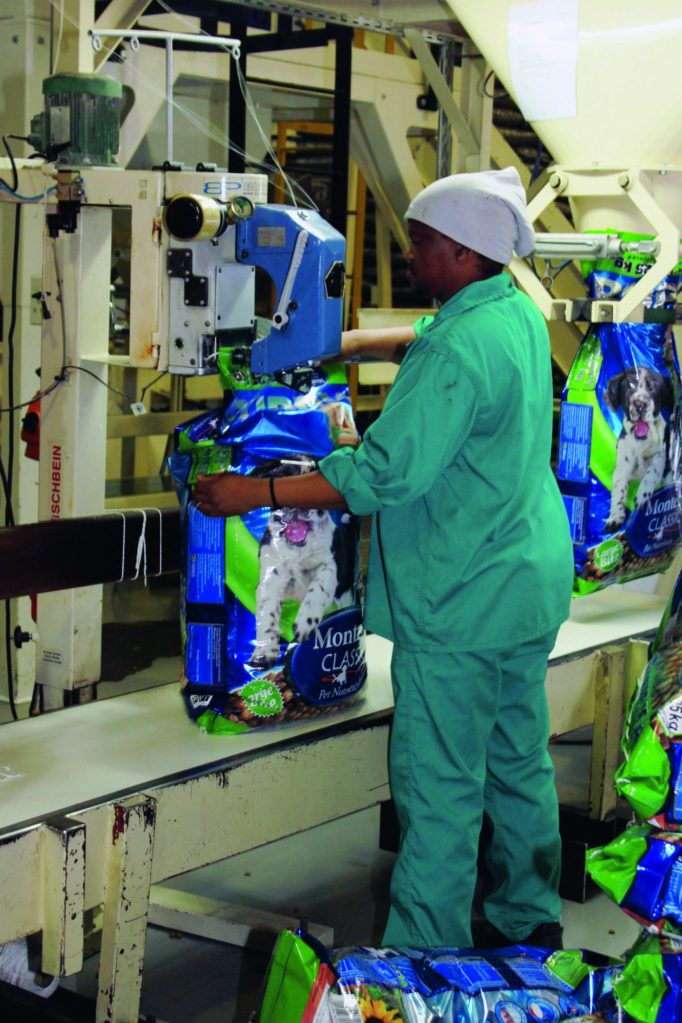Montego Foods is cradled in the fourth oldest South African town, where the Sundays River meanders through the Great Karoo—a semi-desert region in the Eastern Cape Province. Many youngsters leave this quiet idyll for the noise and money of Johannesburg. It is the largest privately-owned employer in the Graaff-Reinet area. These days many more decide to stay and work for Montego Foods.
When Hannes Van Jaarsveld, aged 60, bought the business in 2000 it employed 11 staff, today it employs around 250—220 of which are in Graaff-Reinet. The increase in employment goes hand-in-hand with production. In its first month in 2000, Montego Foods produced 65 tons. It took time to break into the market and after three years the profit began to roll in. Now the company produces up to 200 tons per day and more than 3,000 tons per month.
The company expanded faster than Van Jaarsveld expected. It is worth R100 million ($12,2 million) and is family-owned: Johan (30) is the international marketing manager; Marco (33) is the production manager and Morné (36) is in charge of administration in Graaff-Reinet.

Hannes van Jaarsveld
This solidarity is the company’s greatest asset.
“There are no shareholders, it’s just the four of us,” says Hannes Van Jaarsveld.
“Our biggest advantage in the market place is that we’re a family-owned business, we can make crucial decisions on-the-fly. Each of us always knows what is going on in each department of the business. All four of us are very hands-on all the time. If there is a customer complaint it comes directly to Marco, who is one of the owners of the business, it’s not just a clerk who is a clerk or somebody. It goes directly to management,” he says.
“If we know a customer doesn’t have food on the floor, we will bend over backwards and get the food there because we know that every bag they don’t sell, is a bag we don’t sell. At the end of the day, that bag comes off your bottom line profit. We feel if you’re too big, you can’t do that. We would like to grow our business but we don’t want to lose that personal input and affection of the business,” says Hannes Van Jaarsveld.
At this stage, they are not looking at listing on the South African stock exchange.
The company, which holds more than 20% of the country’s pet food industry, supplies 1,000 South African stores and has 15 depots nationwide. It is looking to expand and exports to Botswana, Angola, Ghana and Zimbabwe. Their biggest competitors are Nola, Nestlé Purina and Royal Canine.
“If you don’t keep expanding your market, you might land up losing your market,” says Hannes Van Jaarsveld.
Montego Foods sells at veterinarians, pet stores and dog parlors. Supermarkets are not part of its strategy.
“Marketing-wise it would have been easier with regards to brand awareness, but logistically and sales-wise it’s easier to compete in the independent market than in the shark-infested waters of the grocery world,” says Johan Van Jaarsveld.
“The main reason being, mainstream retailers, when they start getting bigger, put so much pressure on you, as far as pricing is concerned at the end it’s not worth your while,” agrees Hannes Van Jaarsveld.
Five years after the Van Jaarsveld family purchased the company, they invested between R8 and 10 million (more than $1 million) in the extrusion and production side of the company. In 2010, they invested a further R18 million ($2,2 million) to increase production by 400 percent.
“Every time we increase capacity we go under pressure to meet the local demand. Now is the first time that we are starting to breathe a bit but we are still a bit restricted because the production side can handle a lot more than the milling side,” he says.
Earlier in the year, they approved further expansion, worth R25 million ($3 million), in the milling, grain storage and handling department. While still in the planning process, the project will take a year to complete.
“We could spend R2 million ($245,000) to cut around 30 to 40 jobs but that’s not what we want to do. We want to keep people employed,” says Hannes Van Jaarsveld.
A noble sentiment in these difficult economic times, from a company whose bite is bigger than its bark.
